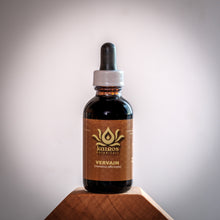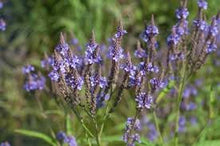Traditionally used for many conditions, including stimulation of lactation and treatment of dysmenorrhea, jaundice, gout, kidney stones, headache, depression, anxiety, and insomnia. Vervain is also considered an astringent, a bitter digestive tonic, and a diuretic. It is a relaxing nervine with a particular affinity for digestion and the liver/ gallbladder, and has a calming effect when feeling scattered, fearful or anxious. It is a useful ally for women throughout menopause, helping to reduce hot flushes, dispel headaches and irritability, and improve sleep.
Made with fresh flowering tops and leaf.
Bottle: 50ml
-----------------------------------
Would you like to know more? Below you can find an excerpt from our book "Medicinal Perennials to Know and Grow"
Ancient cultures throughout Europe and the Middle East held vervain in very high esteem. Its use for medicinal, ceremonial and superstitious purposes goes back thousands of years. The ancient Egyptians, Persians, Druids, Greeks and Romans regarded it as sacred.
Vervain makes an attractive garden plant, with deeply lobed and toothed leaves, that are grey-green in spring, turning deeper green in summer. In late summer, pale lilac flowers appear on tall delicate stalks. Plants grow to about 3 feet high and attract many bees and butterflies. It prefers a sunny, well-drained location and is very drought-tolerant once established. Like many of the other perennials in this book, seeds can be sown practically any time of the year, if you have a spot to maintain young starts before putting them in your garden.
Vervain is a prolific self-seeder; cut back plants before they go to seed if you don’t want this to become an issue. After a few years, plants form clumps that can be divided and replanted. If you want to save seeds, they are easily stripped off the stalks late in the season.
Leaves and flowers are used fresh or dried for medicine. Plants will regrow if cut close to the ground.
Herbalists consider vervain an excellent woman’s herb, relieving congestion and cramps, stimulating menstruation, calming the nerves and lessening hot flashes. In general, vervain helps people wind down and calm down. In herbal texts, vervain is classified as antispasmodic (relaxant), antipyretic (fever reducing), astringent (constrictive), antibacterial and anti-inflammatory. Its astringent effect makes it a good oral rinse for bleeding gums, mouth ulcers and throat inflammation. Its anti-inflammatory properties make it well suited to improve acute and chronic inflammation of the sinuses and respiratory tract.
Vervain is taken as tincture or tea but the tea is quite bitter and takes some getting use to.
Vervain herb is sometimes confused with Lemon Verbena, which is an entirely different plant, although in the same plant family.
In Christian lore, vervain was used to treat Christ’s wounds on the Cross, which is why it is sometimes called Herb of the Cross.
Native American tribes used vervain as a natural treatment for headaches, circulatory issues and insomnia.






